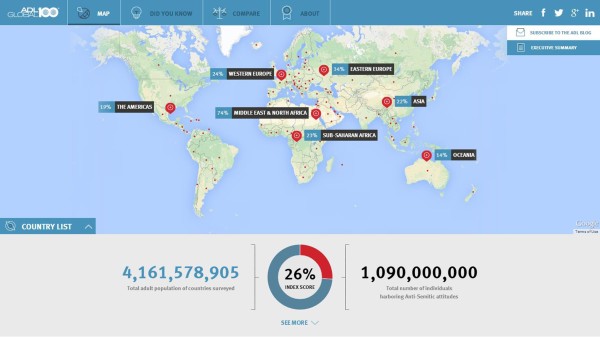by Jim Lobe
It’s no secret that much of the foreign policy establishment here — most notably in recent memory, former CentCom commander Gen. David Petraeus (ret.) — consider the perception of unconditional U.S. support for Israel’s actions in the Middle East as contributing to anti-American sentiment throughout the region. This is not just at the popular level, but at the elite level as well. In a remarkable exchange with Foreign Policy CEO David Rothkopf, even former Israeli Amb. Michael Oren admitted this was a problem, noting, “As for arousing enmity, I have no doubt that America’s alliance with Israel fans Middle Eastern outrage.”
In addition to fueling anti-Americanism, it appears that Israeli actions may also promote anti-Semitism. At least that’s what I glean from a closer look at the monumental survey on global anti-Semitism released earlier this week, which both Marsha and I covered at the time. (Please note that the ADL does not agree with that conclusion. You will see below its response to that hypothesis.) Among many other questions, the survey, which, despite numerous complaints (see here, here, and here), contains an amazing wealth of material, asked its more than 53,000 respondents in 102 countries and the Occupied Territories several questions, the answers to which deserve broader attention. The questions included:
1) Do you have a favorable or unfavorable or unfavorable opinion of Israel?
2) Do you have a favorable or unfavorable opinion of Palestine?
3) Do actions taken by the State of Israel influence your opinions about Jews, or do they not influence your opinions about Jews? Respondents were given options of “major influence,” “minor influence,” or “do not influence.” They could also volunteer that they don’t know.
4) Would you say that the actions Israel takes generally give you a better opinion of Jews or a worse opinion of Jews? This question was asked only of those who in question 3 above said the actions of Israel influence their opinons of Jews.
Now, one of the great things about this interactive survey is that you can find out how respondents in each country and region answered these questions. (To get to specific answers, go to the global map, and press the “See More” caption just under the circle that provides the “index score.” After you press “See More,” you press “Choose a Subject” on the middle right side of the screen to see all the various topics covered by the survey. This post is based primarily on the “Attitudes Toward Israel and the Middle East” subject on that list.)
Now, at the global level — that is, for all 53,000-plus respondents — here are the results:
On question 1 about how they felt about Israel, 35% said they had a favorable opinion; 30% unfavorable, and 35% declined to rate.
On question 2, about Palestine, 36 percent were favorable; 25% unfavorable, and 38% didn’t rate.
On question 3 — whether actions by the State of Israel influenced respondents’ opinions about Jews — 16% said “major influence,” 19% “minor,” 42% said none; and 23% volunteered that they “didn’t know.”
And on question 4, for the 35% who said Israel’s actions did influence their opinions about Jews, 25% said they had a better opinion, but 57% said their opinion of Jews was worsened by Israel’s action, while another 17% volunteered that they didn’t know how they were influence.
Now, those are not insignificant numbers. According to the ADL, the 53,000-plus respondents represent nearly 4.2 billion people, which means the 35% who said that Israel’s actions influenced their opinions of Jews represent nearly 1.5 billion people. Fifty-seven percent of those 1.5 billion adults translates to 855 million people who, if we extrapolate from the survey’s methodology, are willing to tell pollsters outright that Israel’s actions make them see Jews in a more negative light; which is to say, make them anti-Jewish or more anti-Jewish than they already were.
Of course, as you might expect, this is most pronounced in the Middle East and North Africa (MENA) region, the only area in which there is a strong and consistent correlation between anti-Semitism and anti-Israeli sentiment, according to the ADL. Only nine percent of respondents there have a favourable opinion of Israel; 84% are unfavourable, while, conversely, 84% are favourable to Palestine; only 11% unfavorable. And 58% percent of respondents in the region said Israel’s actions exert either a major (46%) or minor (12%) influence on their view of Jews, which is significantly higher than any other region. Finally, of that 58%, nearly nine out of ten (89%) say that influence is negative.
On to Western Europe, where 46% of respondents said they have a favorable opinion of Israel, 26% unfavorable, and 28% declined to answer. Remarkably, sentiment about Palestine was very similar: 48% favorable; 24% unfavorable; 28% declined to answer. On the question of whether actions taken by Israel influenced respondents’ views about Jews, a not insignificant total of 40% said they did, 18% in a major way, 22% in a minor way, and 52% of respondents said Israeli behavior had no influence on their opinion of Jews. Of that 40% who said they were influenced, however, 64% said it affected their opinions of Jews for the worse, while only 16% said they had a more positive view. These findings must surely be of concern to Bibi Netanyahu who, of course, knows very well that Western Europe is Israel’s biggest trading partner by far and that the Boycott Divest Sanctions (BDS) movement appears to be gaining momentum.
In Eastern Europe — despite the fact that the ADL survey found it to be the second-most anti-Semitic region after MENA — more than six in ten respondents (61%) said they had a favorable opinion of the country, compared to only 46% who said the same about Palestine. Just over a third of respondents (34%) said Israeli actions influenced their opinions about Jews (14% major influence, 23% minor). Of that 34%, 55% said Israeli actions gave them a worse opinion of Jews; 21% said Israeli actions gave them a better opinion.
Sixty-one percent of respondents in the Americas, which is treated by ADL as one region, also hold a favorable opinion of Israel (73% in the U.S.), while only 40% have a similar view of Palestine (45% in the U.S.). Only one in four respondents (16% in the U.S.) said they believed Israeli actions influenced their opinion of Jews, equally split between major and minor. Of those, 35% said Israeli actions gave them a better opinion of Jews, while 45% said they gave them a worse opinion. In the U.S. those percentages were roughly reversed — 46% better versus 36% worse. In fact, the U.S. was just about the only country outside of sub-Saharan Africa where Israel’s actions gave respondents a better impression of Jews than a worse one. In Canada, for example, of the 21% of respondents who said Israel’s behavior influenced their opinion of Jews, 69% said they were affected negatively. Even in Oceania (Australia and New Zealand), where two-thirds of respondents reported having a favorable opinion of Israel (and 60%, remarkably, a favorable opinion of Palestine), of the 23% of respondents who said Israeli actions influenced their opinions about Jews, 71% said those opinions were affected negatively.
In Asia (which included Caucasian states like Armenia, Azerbaijan, and Georgia, as well as India, China and Japan), opinions about both Israel and Palestine were roughly evenly split — 26% favorable, 30% unfavorable and 28% favorable, 25% unfavorable, respectively. About one third of respondents (34%) said Israeli actions influenced their opinions about Jews (13% major, 21% minor). Of those, 54% said their attitudes were affected negatively; 27% positively.
Finally, in sub-Saharan Africa, Israel was viewed favorably by 52% of respondents, unfavorably by 22%, while only 27% felt positively about Palestine compared to 39% who had an unfavorable impression. A total of 35% of respondents reported that Israel’s actions influenced their views about Jews, evenly split between major and minor. Of that percentage, slightly more respondents said Israeli actions gave them a better impression (44%) than a worse one (42%).
So it’s quite clear that MENA is very much the outlier (although, given its proximity to Israel, it’s quite a pertinent one) on the question of to what extent Israeli actions contribute to negative views of Jews in general. But of those respondents who say that Israel’s behavior influences their views of Jews, pretty solid majorities in Western Europe (64%), Eastern Europe (55%), Asia (54%) and Oceania (71%) — and a plurality in the Americas (45%) — assert that their impression of Jews is more negative. It is difficult, therefore, to escape the conclusion of some correlation between Israeli actions and the rise or intensification of anti-Semitism as a result in key regions beyond MENA. ADL, however, as you can see below, rejects this notion.
Now, of course, many of the respondents who said Israeli actions gave them a negative impression of Jews were already anti-Semitic (as defined by the ADL Index), in which case the cause and effect are very difficult to disentangle. In addition, it’s worth noting that the vast majority of respondents have no personal connection to Israeli actions and depend on other sources, notably mass media, for their understanding of those actions. On the other hand, however, it seems safe to say that Israel’s actions — at least as reported by those same mass media — do not help the cause of eliminating anti-Semitism around the world, and especially in its own neighborhood where, in fact, Israeli actions have been felt most directly.
I asked ADL to comment on these observations, and their director of international affairs, Michael Salberg, was kind enough to send me the following reaction, which should also be taken into consideration.
Based on our experience in dealing with the very difficult question of overlap between expressions of anti-Israel sentiment and anti-Semitism, we know that often, though not in every case, the two can be closely connected. This is especially so in the Middle East, but also in European society and elsewhere.
Our pollsters have concluded there is no clear evidence in the data that anti-Israel feelings are causing anti-Jewish sentiment, or vice-versa. There are countries where anti-Israel sentiment is much more prevalent than anti-Jewish sentiment. And there are other countries where anti-Jewish sentiment is much more prevalent than anti-Israel attitudes.
In MENA there are high levels of both anti-Israel sentiment and anti-Jewish sentiment. But in other regions, things are more complicated and regression analysis does not show a strong correlation between Israel’s unfavorable rating and anti-Semitic attitudes.
It is true that people who say the actions of the State of Israel influence their opinions of Jews tend to have higher Index Scores than people who say the actions of Israel do not affect their opinion of Jews. However, in every region but MENA, the vast majority of people, 60 percent or more, say that the actions of Israel have no impact on their opinions of Jews or they don’t know:
To reinforce this point, only 35% of respondents worldwide are unfavorable toward Israel, and of those only half, 51 percent, say that the actions of Israel affect their opinions of Jews. So the worldwide Index Score of 26% is higher than the percentage who are unfavorable towards Israel and say Israel’s actions affect their opinion of Jews. We are reluctant to use or describe the data as support for links between attitudes towards Israel and anti-Semitism outside MENA. Even within MENA, ascribing cause and effect was beyond the scope of the survey.
In any event, as I noted above, this is a very rich survey of international opinion that is well worth exploring in the varying levels of detail which it offers.
Follow LobeLog on Twitter and like us on Facebook.






One can hate israel, as an oppressive state, but don’t hate the Jews. If I were Palestinian and they had demolished my home I would hate the state of israel. But it wouldn’t necessarily mean I would hate Jews.
Interesting post, along with the here, here and here links too, as were the comments. Considering the source of the survey, it’s not unusual to question the validity of the answers. It’s healthy to be able to speak ones mind about this subject, as here and the other posts comments, but then, by the standards of the survey, could the commentators also be classified? Actions speak louder than words, which should be a question in any survey of this type.
Of course, Israel’s actions will affect the opinion of Jews, since Israel declares itself the state of the Jewish people. Jewish Israelis are very hostile towards non Jews in Israe./Palestine. They persecute them, demolish their homes, build settlements and roads for Jews Only, and have many laws that discriminate against non Jews. Why would people have a favorable opinion of Jews when they treat non Jews this way?
Also, in this country AIPAC is trying to lead the US into another war, this time with Iran. think many Americans resent the fact that we have Israel Firsters in our government and media that put Israel’s interests ahead of our own. Many people see that as dangerous and a disloyal, like a fifth column working for another country.
Given that Israel knows its bad image in MENA, and its proximity and borders with some of these nations, I am curious as to why they do not attempt to fix the problem. Seemingly the only solution that they have come up with is to build a tall wall around lands that they keep taking and building upon, in contravention of all agreements that have been made. It is not really that imperative that someone living ten thousand miles away has a positive view of Israel, but, those that are its immediate neighbors and those that are in its approximation, they are the one’s that can become venue of trade, commerce and goodwill. Israel should focus on these nations instead of building more walls.